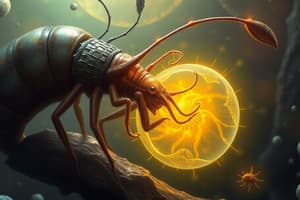Podcast
Questions and Answers
What is the definition of an incidental (accidental) parasite?
What is the definition of an incidental (accidental) parasite?
- A parasite that completes its life cycle within a single host.
- A parasite that exclusively infects humans.
- A parasite that cannot survive outside of its definitive host.
- A parasite that is not typically found in a specific host. (correct)
Which of the following best describes encystation?
Which of the following best describes encystation?
- The migration of larvae to a new host.
- The formation of a protective structure around a parasite. (correct)
- The development of a parasite into its reproductive stage.
- The process of a parasite multiplying in a definitive host.
What stage of Plasmodium species is infective for humans?
What stage of Plasmodium species is infective for humans?
- Cyst
- Sporozoite (correct)
- Immature trophozoite
- Mature trophozoite
Which type of parasite do cercaria larvae belong to?
Which type of parasite do cercaria larvae belong to?
Which characteristic is associated with Trematodes?
Which characteristic is associated with Trematodes?
What type of fluke is Paragonimus species classified as?
What type of fluke is Paragonimus species classified as?
Which organism is responsible for causing Cysticercosis?
Which organism is responsible for causing Cysticercosis?
What is the primary difference between amastigotes and promastigotes of Leishmania?
What is the primary difference between amastigotes and promastigotes of Leishmania?
Flashcards
Incidental parasite
Incidental parasite
A parasite that doesn't typically infect a particular host but can cause infection under specific, unusual circumstances. This is not its primary host.
Intermediate host
Intermediate host
An organism that a parasite lives in during a part of its life cycle, where it may develop or reproduce asexually, but is not the definitive host.
Definitive host
Definitive host
The host in which a parasite reaches sexual maturity and reproduces.
Ascaris lumbricoides definition
Ascaris lumbricoides definition
Signup and view all the flashcards
Cercaria larva
Cercaria larva
Signup and view all the flashcards
Fasciola hepatica
Fasciola hepatica
Signup and view all the flashcards
Infective stage of Plasmodium
Infective stage of Plasmodium
Signup and view all the flashcards
Paragonimus species classification
Paragonimus species classification
Signup and view all the flashcards
Study Notes
Parasite Definitions
- Incidental (accidental) parasite: Parasite that is not typically found in a specific host, but may accidentally be hosted there.
- Amoebiasis: Infection caused by Entamoeba histolytica parasite.
- Parasitism: Relationship where one organism (parasite) benefits at the expense of another (host).
- Intermediate host: Organism that harbors the larval stage of a parasite.
- Encystation: Process by which a protozoan forms a cyst.
- Cercaria larva: Larval stage of some trematodes.
- Ascaris lumbricoides: A roundworm that causes ascariasis.
- Balantidium coli: A ciliated protozoan that causes balantidiasis.
- Definitive host: Organism that harbors the adult stage of a parasite.
Parasite Morphology and Differences
- Amastigotes and promastigotes: Different morphological forms of Leishmania.
- Extraintestinal amoebiasis: Amoebiasis that occurs outside of the intestines.
- Egg or nits stage of pediculus: Stage where pediculus species lay their eggs.
Life Cycles
- Asexual phase of Plasmodium life cycle: Flow chart describing the asexual reproduction of Plasmodium in the host.
- Sexual phase of Plasmodium life cycle: Flow chart describing the sexual reproduction of Plasmodium in the host.
- Fasciola hepatica: Description and information about the liver fluke parasite
- Ascaris lumbricoides life cycle: Paragraph describing the life cycle of this roundworm.
- Pre-erythrocytic cycle of Plasmodium: Brief description of this step in the life cycle.
- Trematodes characteristics: Basic characteristics.
- Classification of helminths: Brief account
- Entamoeba histolytica life cycle: Flow chart of its life cycle
- Differences between hard and soft ticks: Information and description
Infective Stage of Plasmodium
- Infective stage of plasmodium: Sporozoite is the infective stage of Plasmodium for humans.
Cercaria Larvae and Paragonimus
- Cercaria larvae: Belong to the Fasciola hepatica.
- Paragonimus species: Liver fluke.
Cysticercosis
- Cysticercosis: Zoonotic infection caused by Taenia solium.
Studying That Suits You
Use AI to generate personalized quizzes and flashcards to suit your learning preferences.
Description
This quiz covers key definitions and concepts related to parasites, including types of parasites, their life cycles, and morphological differences. Explore terms such as incidental parasites, definitive hosts, and various stages of amoebiasis to deepen your understanding of parasitology.




